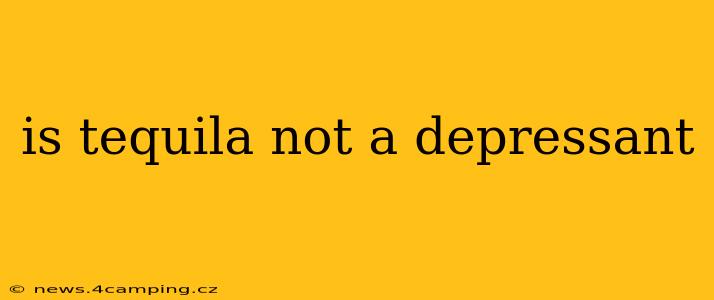Is Tequila Not a Depressant? Understanding Tequila's Effects
Tequila, like all alcoholic beverages, is a depressant. This means it slows down the central nervous system, impacting brain function and bodily processes. The misconception that tequila might not be a depressant likely stems from its association with lively celebrations and energetic social settings. However, the stimulating effects often perceived are actually a result of social interaction and the initial mild euphoria that some experience before the depressant effects fully take hold.
Let's delve into this further and address some common questions:
How does tequila act as a depressant?
Tequila, a distilled alcoholic beverage made from the blue agave plant, contains ethanol. Ethanol is the active ingredient responsible for the depressant effects. It interacts with various neurotransmitters in the brain, disrupting normal communication pathways. This disruption can lead to a range of effects, depending on the amount consumed and individual factors.
Doesn't tequila give you energy?
The feeling of increased energy or sociability often linked to tequila consumption is not actually a stimulant effect. Instead, it's a result of the initial release of dopamine and other neurochemicals, masking the depressant effects in the short term. As consumption continues, the depressant effects become increasingly dominant, leading to impaired coordination, slowed reaction times, and ultimately, drowsiness or even unconsciousness.
Are there differences in how tequila affects people compared to other alcohols?
While the depressant effect is consistent across all alcoholic beverages, individual responses can vary. Factors such as body weight, metabolism, gender, and even the type of tequila consumed can influence the intensity and duration of the effects. Furthermore, consuming tequila on an empty stomach can lead to a quicker and more intense onset of its effects. The presence of congeners (impurities) in some tequilas might also contribute to the severity of hangovers, although the depressant effect itself remains consistent.
Why do people think tequila isn't a depressant?
The perception that tequila is not a depressant is likely due to a combination of factors:
- Social context: Tequila is often consumed in social settings, where the stimulating effects of interaction and the initial mild euphoria might overshadow the depressant effects.
- Marketing and cultural associations: The marketing of tequila often emphasizes its celebratory aspects, potentially downplaying its depressant nature.
- Individual differences: The effects of alcohol vary greatly from person to person, and some individuals might experience a delayed or less pronounced depressant effect.
What are the potential dangers of tequila's depressant effects?
Ignoring the depressant effects of tequila can lead to several dangers, including:
- Impaired judgment and decision-making: This can result in risky behavior such as drunk driving or engaging in unsafe activities.
- Alcohol poisoning: Excessive consumption can lead to alcohol poisoning, a potentially life-threatening condition.
- Long-term health problems: Chronic alcohol abuse can damage the liver, heart, and brain, leading to various health complications.
In conclusion, tequila is undeniably a depressant, despite the perception sometimes associated with its consumption. Understanding its effects and consuming it responsibly is crucial for safeguarding your health and well-being. Remember, moderation is key, and it's important to be aware of your limits and the potential dangers of excessive alcohol consumption.
